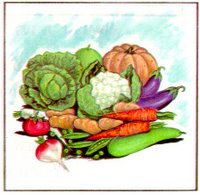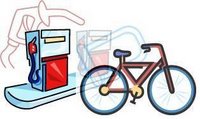
This is a continuation of my
previous post about
Vegetarianism. In that post, I pointed out that one of the reasons for joining the "veggie" band was - "because it is good for the environment". In other words, "
eating greens is important if you truly wish to become
Green". In this post, I try to explore this issue of vegetarianism and environment.
In today's globalized world, the food we consume is not necessarily produced in our backyard or even in our country. That bottle of water you may have on your table or that sandwich you just ate for lunch or dinner contained ingredients which probably came from all over the world. Energy is expended at each and every stage in the food production~packaging~delivery chain. Let us have a comparative look at the important steps in this chain for vegetables and for meat (e.g. beef).
| Vegetables/Grains: | Meat: |
- Growing and harvesting (Fertilizers, Pesticides, Seeds, Farm implements etc.)
- Packaging (material, process)
- Transportation and storage (refrigeration, fuel for transport etc.)
- Processing (most grains are processed into some other product before consumption)
| - Growing and harvesting feed stock for animals (Fertilizers, Pesticides, Seeds, Farm implements etc.)
- Transportation of feedstock
- Energy input to the animal farm facility (includes stuff like growth hormones or other drugs given to the animals)
- Transportation of animals to meat processing facility
- Meat production
- Packaging
- Transportation to final consumer.
|
It is clear that meat production involves more number of steps than vegetable production. The energy input in most of the cases is in the form of fossil fuels. Most of the fertilizers, chemical pesticides used have significant fossil fuel input in it. Transportation and farm machinery etc. requires fuel. The packaging (e.g. plastic boxes, wrapping etc.) requires fossil fuel inputs. Every morsel of food we consume provides us with energy, which is commonly measured in Calories. 1 food Calorie = 1000 thermodynamic calories or 1 kcal (I can't believe I was unaware of this fact so far!). The energy contained in fossil fuels is also given in terms of "calories/kg" or the calorific value of the fuel. So a simple measure of the energy efficiency of our diet is:
The ratio of calories of energy that we get from the diet to the calories of (largely fossil fuel) energy that go into producing that diet and bringing it to our homes.
Therefore,
% efficiency = 100 x (kcal energy output from food) /(kcal energy input into food)
Now, I am not the first one to come up with this concept. Energy sources are valuable and there have been a lot of studies done to understand how much energy we consume and the way we consume it. David and Marcia Pimentel from
Cornell University have done extensive research in this area. Their book, Food Energy and Society [
1] contains a lot of data regarding the energy input for various kinds of food production systems. They have calculated the amount of fossil fuel energy (measured in kcal) input in the food production system per kcal of
food protein produced, for different food groups (meats, legumes, vegetables etc.). Note that the energy output is only for the protein content of the food a not
total energy content. Most meats have large protein content while most grains and vegetables don't. I am tabulating some of the data which is relevant to our purpose here {from [
1], chapters 8, 9, 10 and 11}:
| Food Products | % energy efficiency |
| Animal Products |
|
| Chicken | 6.3% |
| Milk | 5.3% |
| Eggs | 3.6% |
| Beef | 2.9% |
| Range Beef | 10% |
| Pork | 1.5% |
| Lamb | 0.5% |
| Range Lamb | 6.3% |
| Tuna | 5% |
| Shrimp | 0.7% |
| Vegetables/Grains |
|
| Corn | 250% |
| Wheat | 220% |
| Oats | 510% |
| Rice | 210% |
| Apples | 110% |
| Oranges | 170% |
| Potatoes | 123% |
| Spinach | 23% |
| Tomatoes | 60% |
The numbers speak for themselves. It is clear that producing meat and animal products is a highly inefficient operation (in terms of energy efficiency as defined above). It is not simply about fossil fuel consumption. Producing meat/animal products consumes a large amount of land and water as well. But that is a totally different topic of discussion. For some interesting information on that I refer you this study [
2]. David and Marcia Pimentel also compare various types of diets in their book. Data collected by them shows {from [
1], page 147} that a non-vegetarian diet requires twice as much fossil fuel energy input as compared to a vegetarian diet. Lacto-ovo diet falls somewhere in between these two.
Another interesting study I found online while searching for references is a yet to be published paper [
3] by
Gidon Eshel and
Pamela Martin of
The University of Chicago. They have used the energy input data given in [
1] to compare the total green house gas (GHG) burden of many different diets (red-meat based, average American diet, lacto-ovo, vegan) with varying percentage of animal products. Without going into details, here are some interesting results one can find in this study {from[
3], Figure 3}:
- The difference between GHG burden of average US diet (27% Animal products) and a totally vegan diet is ~1.5 ton per person per year. Compare this to the difference in GHG burden of Toyoto Camry and Toyota Prius which is ~1.05 ton per person per year.
- Switching from a red meat based diet (27% animal products) to a lacto-ovo diet (27% animal products) is equivalent to switching from a Toyota Camry to a Prius in terms of the GHG burden.
Anyway, there are many interesting articles, studies, books out there which more or less agree that a plant based diet is more efficient and sustainable than a meat based diet. If you are seriously thinking about switching from that SUV to an energy efficient car, why not think about switching to a plant based diet? At the very least, you can think about cutting down the proportion of meat you consume. If you are a true
Green, think about eating green too.
Given below are the references mentioned above and links to other articles I came across while researching for this post. One of the links given have many good tips if you want to switch to a veggie diet. In my next post I want to answer the question - "
how many miles per gallon does my bicycle give?". I think I have enough data gathered to do the calculation, so stay tuned.
Update (03/20/2006): What's the mileage on that bicycle?
References:
[1] Pimentel D., and M. Pimentel (Editors), 1996. Food, Energy and Society, University Press of Colorado, 363p. ISBN: 0870813862 [link]
[2] Pimentel D., and M. Pimentel, 2003: Sustainability of meat-based and plant-based diets and the environment. American Journal of Clinical Nutrition, 78(3), 660S-663S. [subscription reqd.]
[3] Eshel, G. and P. A. Martin, 2006: Diet, Energy and Global Warming. In press, Earth Interactions. [pdf link thanks to Judith's blog]
Links:
[::] Eating Fossil Fuels by Dale Allen Pfeiffer [pdf link]
[::] Why Our Food is so Dependent on Oil by Norman Church
[::] The Ethics of Eating Meat by Charles Eisenstein. (Makes a case for farm raised animals and ethical meat eating)
[::] Fossil Fuels and Energy Use @ The Sustainable Table (Has many useful tips to have a more sustainable kitchen for both vegetarians and meat eaters).
[::] Veg How To? @ VegForLife (tips for converting to the veggie creed)
[::] Meat Production's Environmental Toll by Stephen Leckie @ Toronto Vegetarian AssociationTechnorati Tags: Vegetarianism, Environment, Food production, Energy efficiency, Fossil fuels
 "Huh! what's that again?"
"Huh! what's that again?" This is a continuation of my
This is a continuation of my  There was
There was